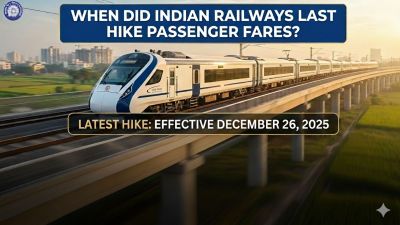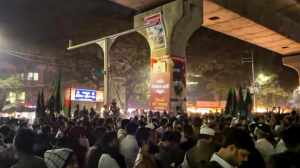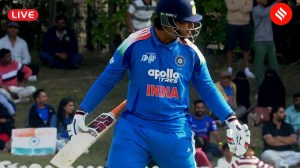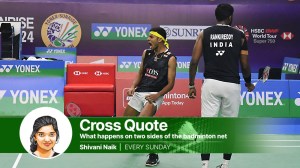Union Minister Jayant Chaudhary on the role of the NDA allies, Waqf (Amendment) Bill, employment schemes announced in the budget and the NEET controversy. This session was moderated by Asad Rehman, Senior Correspondent, The Indian Express
Politics is about the art of exploring the possible. From our party’s perspective, there was a clear understanding of the direction that the country had taken. We had to take some real decisions based on the political framework that was emerging. Then the government took the decision of giving Bharat Ratan to Chaudhary Charan Singh.

It was a long-standing demand; my father had voiced it on many occasions. The PM has shown some faith; he’s shown through this one step a vision that they want to honour the legacy of Charan Singh. That’s our cause. Elections were upon us. There was also a discussion with Akhilesh Yadav but there were some issues there.
Asad Rehman: Do you think the BJP allies are now going to play a bigger role in the parliamentary proceedings? Your party criticised a Uttar Pradesh (UP) government order on the kanwar yatra issue. The TDP has criticised the Waqf (Amendment) Bill.
Dependency on allies is the nature of the game. We might put up a public front where we say that the leadership of our front is so strong and visionary but there is a dialogue behind the screen. There is consensus-building. This is also the public mandate. The Opposition is still in opposition.
They have told the Opposition that you are a good opposition.

Liz Mathew: How do you think your party will grow in UP because the BJP has a history of finishing off the smaller parties?
When you’re dealing with another party, they’re going to do what’s better for them. That has been our arrangement with every party we’ve aligned with. The issue is, when we are sitting down, we must deal with each other with respect and on equal terms. Even at the level of the PM, I found that they have a nuanced understanding of that relationship. Lok Dal is not a stranger to the BJP. We got estranged and now we’ve come back.
 Idea Exchange with Union Minister of State (Independent Charge) for Skill Development and Entrepreneurship Jayant Chaudhary on Tuesday, (Express Photo by Gajendra Yadav)
Idea Exchange with Union Minister of State (Independent Charge) for Skill Development and Entrepreneurship Jayant Chaudhary on Tuesday, (Express Photo by Gajendra Yadav)
From our political perspective, we are looking at putting our issues on the table. We’re going to propose things that are for the betterment of our region and people. The BJP is also a stakeholder. The BJP has strong roots in Western UP, where we have majority of our legislators. We also have an MLA who repeated his seat in Bharatpur, Rajasthan. We have people in Purvanchal, Madhya Pradesh and Bundelkhand.
Story continues below this ad
Liz Mathew: Do you mean expanding from UP to other states?
Yes. In Rajasthan, principally. In Haryana we have presence, but I’m not sure that we’re going to take the plunge electorally.
Ritika Chopra: There was a controversy over the conduct of NEET examination. What are the reforms needed in the National Testing Agency (NTA)?
To be honest, that’s not my department, I look at schools. I think it’s not an easy task. It’s challenging because in India everything is competitive. The scale of what the NTA has conducted is also something to, in a way, celebrate — more than 200 exams have been conducted and more than five crore people have given exams. This has to be an ongoing exercise. We have to constantly look at how the system is being gamed or not. We need to autocorrect. I think that’s the task given to a committee. Let’s wait for that report. But, perhaps, things can be done with the scheduling. Whenever you have one annual date, it becomes a little troublesome.
Ritika Chopra: In the last 10 years, our school textbooks have undergone a lot of change. Several of those, especially in social sciences, have been quite politically sensitive. The latest one pertains to the demolition of the Babri Masjid. One specific change was that they removed the name of the masjid. What are your comments?
They call it a two-dome structure, which is in line with the (Supreme Court) judgment. That was the ground on which that particular wording was used.
Change is an ongoing process as long as we have academicians who are driving that, which we do at the National Council of Educational Research and Training (NCERT). We can pick a change and say why we’re not comfortable with it. We always have that freedom. But a lot of things get played out, which is not the reality. For instance, in this session, it got raised in the House that you removed the preamble of the Constitution (from the school textbooks), and the Education Minister responded. The government put its information in the public domain that we haven’t removed it. It’s about contextualising. So the NEP is talking about contextualising education, delivery, pedagogy and the curriculum.
Story continues below this ad
Vikas Pathak: How do you explain the steep fall in the tally of the BJP in UP?
No one can predict elections in India. We can do a post-mortem of what happened in UP. The whole constitutional question had deep resonance in deprived sections, which is a big population in UP. They were thinking of how to make their vote effective.
 Idea Exchange with Union Minister of State (Independent Charge) for Skill Development and Entrepreneurship Jayant Chaudhary on tuesday, Express Photo by Gajendra Yadav,130824
Idea Exchange with Union Minister of State (Independent Charge) for Skill Development and Entrepreneurship Jayant Chaudhary on tuesday, Express Photo by Gajendra Yadav,130824
That, at the last minute, shifted in a few seats. There was no anti-incumbency against the government as such. None that I could assess against the PM. But if an MP is not performing and you are still stuck with the winning team, sometimes that happens. Local factors also came up.
Asad Rehman: Since you spoke about the Constitution during the elections, there were also many within the BJP who raised this issue. Do you think that impacted the NDA’s performance in UP?
The Supreme Court has already laid the law of the land. You cannot change the basic structure of the Constitution. Even if someone gets 450 seats in Parliament, it’s still not going to happen. The Constitution is a living document. It’s not set in stone. Apart from the basic structure, the Constitution is also responding to the needs of the nation. So an amendment is possible, but no wholesale changes are ever going to happen. Whoever said it, whether it was from the BJP or any aligned partner or people from the Opposition, it’s wrong.
Vikas Pathak: You joined the NDA recently but before that there were two instances in UP where you were part of the agitations. One was during the farmer agitation. In hindsight, do you think there was a genuine problem with the three farm laws that have been repealed? Also, in Hathras, you came under police attack. What is your assessment of the UP government?
Farmers are always right and I think the government was wrong in not listening to them when they were there for 13 months. Eventually, the government realised it is the states’ issue. In UP, the crops are not in the APMC (Agricultural Produce Market Committee). You want to develop a competitive private market. That provision already exists. You need to do that.

Story continues below this ad
I don’t think people in UP are satisfied. They may be happy with a measure or two. One thing that I can assess is that there is a clean track record, in the sense that there is no personal liability of the Chief Minister (CM). Of course, in terms of policy, a lot more creative ideas need to flow. A state sports university is being built in Sardhana. I hope it catches speed. On education, you need to do a lot more. More needs to be done on sugarcane. I don’t think the price increase has kept up with what the farmers want.
Asad Rehman: Do you think that pending the Hindenburg investigation, the SEBI chief should step aside?
I wouldn’t go that far. There is a clarification that has already come out. This was already a known investment. It was an older investment, predating her appointment as SEBI chief. As long as there is transparency, it’s fine. You can’t equate an institution with an individual. Individuals in the seat don’t really matter as long as there is institutional credibility. We have to give SEBI that.
On the Hindenburg report and the SEBi Chief: It was an older investment, predating her appointment as SEBI chief… Individuals in the seat don’t matter as long as there is institutional credibility. We have to give SEBI that
Neerja Chowdhury: Is Yogi Adityanath likely to be replaced so as to get ready to win the 2027 elections and win back the OBC vote? When you took over, many felt you will recapture the base that your grandfather represented — of Jats, OBCs and Muslims. That is a constituency the INDIA bloc is now capturing. Have you made a mistake by shifting to the NDA?
I don’t cry over spilled milk. Neither am I a predictor of the future. I like to think about what is immediate for me. Right now, I have a seat on the table. I’ve been given very technical and challenging ministries. There are around 25 crore school students. I am busy with skilling and convergence, where we are running programmes that run across ministries. Looking back, I can say that this was a right decision and that was wrong. But I am happy where I am.
Shyamlal Yadav: Chaudhury (Charan Singh) sahab would get angry about being called a Jat leader. Your party has gradually reduced into a party of a section of Jats only. It struggles for two-three Lok Sabha seats and a dozen assembly seats in western UP. Do you think his legacy has been reduced?
His legacy isn’t reducing. Political footprint has surely reduced. People should stop asking me about being a Jat politician. I’ve been hurt politically in one election. I got so tired of being asked what are Jats going to do that I said, I don’t know what Jats are going to do. In fact, when I first came on a public stage, I went to Lucknow and commented on one thing because Chaudhary sahab was fervently an advocate for breaking this hold that caste has on our society. So, I said, inter-caste marriages should happen. I got backlash from all khap leaders but I’ll still stick by it because that is what Chaudhary sahab stood for. So, I am honouring his legacy. Whether my seats reduce to zero or go up, that’s not Chaudhary Charan Singh’s legacy.
On need for state sanction for interfaith marriages in UP: I’m not for such a policy. We all have the freedom to practice our religion. We also have the freedom to not follow any religion. We have to give more freedom to individuals
Story continues below this ad
Shyamlal Yadav: The government doesn’t agree with SCs subcategorisation. OBCs’ subcategorisation committee has been made. We don’t know when the Rohini Commission report in the Centre and the Raghvendra Kumar Commission report in UP will be released and implemented. Should the sub-categorisation of OBCs be also opposed like SCs?
Caste is a very complex issue. I haven’t been able to understand castes even now. Caste is a reality. Indian society should first accept that. Affirmative action is one way of doing it. It’s not going to solve all our problems, and that’s what I said, even at an INDIA meeting. There were two people in the INDIA meet who were not in consonance with the resolution on caste census.
Data-centric decision-making is a must but we have to understand that caste data is inherently tricky to capture. There may be some dominant castes in every category. The question is, we have to see how to extend the benefit to others. There are things beyond just the reservation and all of this.
Liz Mathew: You said you’re aware of two parties.
I don’t want to name the other party. They’re still in INDIA, maybe not, I don’t know. From an eastern state.
Manu Kaushik: The budget has announced some employment and internship schemes. What role is your ministry going to play in that?
On proposal for internships in India’s top 500 companies: If the private sector wants to remain competitive in a globalised economy, they have to invest in training, internships… Government isn’t using a stick to enforce this
The design is being worked out and the approach of the government now is one of building convergence into the design of every scheme. In the PM Vishwakarma scheme, we are doing the skilling, and they are getting the beneficiaries through the MSME ministry. There are several ministries coming together for several schemes of the government. Ministry of Rural Development is working on the Lakhpati Didi programme. We are doing the skilling on the drones. The skill development ministry has an apprenticeship programme (NAPS) under which we are paying Rs 1,500 per month, per apprentice. We have another programme called NATS (National Apprenticeship Training Scheme).
Story continues below this ad
Dheeraj Mishra: The UP government has come up with an amendment in the anti-conversion law that is already under challenge in the Supreme Court. The ambit of the complainant has increased and there is maximum punishment of life imprisonment. Is it a concern, considering it will lead to further targeting of Hindu-Muslim couples?
Every policy or measure can have unintended systemic impacts. As policy makers, we must understand that. Our intention is good but if it’s not effective, our work is useless. What you’re saying is a real concern.
Apurva Vishwanath: This law requires state sanction for interfaith marriages. What do you think about that?
I’m not for such a policy. We all have the freedom to practice our religion. We also have the freedom to not follow any religion. So, I think, we have to give more freedom to individuals.
Muzamil Jaleel: You talk about inclusiveness and you’re in an alliance where a CM says that he will not allow transfer of property; Hindus can’t sell to Muslims and vice-versa. During elections, communal talk is normal. Isn’t it hypocritical?
We have to choose our battles. I’m fighting the war also, I am winning a battle also. That’s how I look at it. I am not Yogi. I don’t have to agree with everything he says or does. And we are not BJP, we are an alliance.
Shahid Pervez: The government has now brought the Waqf (Amendment) Bill. There are massive concerns that it has been brought to take over Muslim Waqf assets. What is your assessment?
I need to study it a little more. We have to understand that whatever you might say, the need for the policy and why this policy has come out is coming from the right place.
Story continues below this ad
It is perhaps the largest land bank in our country. There are many disputes on it. The design of that system may be causing a lot of abuse and hardship for Muslims. So, the government can take the view that we are doing this for the benefit of the minority community so that these assets are completely utilised for their benefit.
Shahid Pervez: A collector can effectively decide whether this mosque is on government land or this belongs to Waqf.
But they must have some social audit built into that. If it’s not in the law, it will be in the rules… This land has a circle rate. Maybe the market rate is less than that. If you sell the land and do registry at less than that, you need the DM’s approval. When you look at every law, DM approval is almost hard-coded into everything.
Soumyarendra Barik: There is a proposal for one crore internships in India’s top 500 companies over the next five years. Given their poor employment record, how much incentive do they have to spend money on training?
If the private sector wants to remain competitive in a globalised economy, where change is the only reality, then they have to do this. The government isn’t using a stick to enforce this. For NAPS, there’s still a stick. Fines and all. If you have 30 employees and above, you have to keep an apprenticeship… It’s a facility the government is going to provide. Their screening cost is reduced. The retention rate is going to be high. The companies have everything to gain.

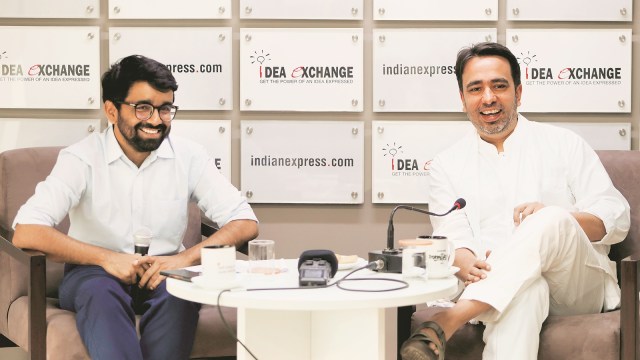


 Idea Exchange with Union Minister of State (Independent Charge) for Skill Development and Entrepreneurship Jayant Chaudhary on Tuesday, (Express Photo by Gajendra Yadav)
Idea Exchange with Union Minister of State (Independent Charge) for Skill Development and Entrepreneurship Jayant Chaudhary on Tuesday, (Express Photo by Gajendra Yadav) Idea Exchange with Union Minister of State (Independent Charge) for Skill Development and Entrepreneurship Jayant Chaudhary on tuesday, Express Photo by Gajendra Yadav,130824
Idea Exchange with Union Minister of State (Independent Charge) for Skill Development and Entrepreneurship Jayant Chaudhary on tuesday, Express Photo by Gajendra Yadav,130824

